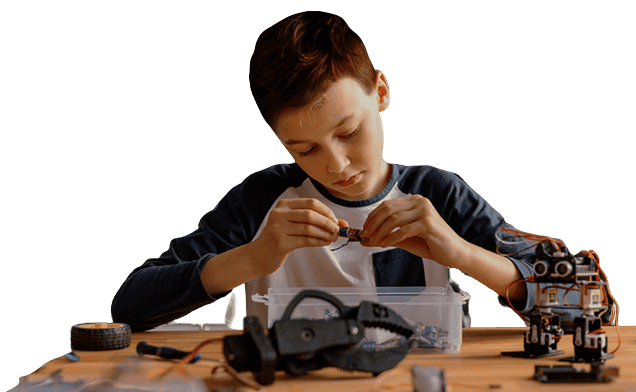Children are perpetually curious creatures. Curiosity is the driving force which motivates people to learn. Often our current education system focuses on completing the set curriculum and the ‘right vs. wrong answer’.
Instead of exploration and critical thinking, students end up relying on rote learning and become more enamored by the ‘answers’ rather than being curious about the process of deriving these answers. At Radcliffe, we know that every parent’s dilemma is ‘What can I do to provide the best education to my child? We help you with your child’s growth in the formative years and lay the foundation for a strong future.
We don’t teach lesson plans, we teach children – curious, exuberant and special in their own way
Our role as guides, teachers and caregivers is to consistently provide a steady supply of the nourishment needed to keep the curiosity fed. Fostering this wide-eyed wonder and quest for new learning in our children is not about ‘making them curious’ rather it is about ‘helping them remain curious’. We encourage our students to explore and seek answers for themselves.

Building and NurturingLeaders of Tomorrow
Propelled by our educational philosophy seeped in the best of traditions and modernisation, we are unleashing a generation who will question the status quo and bring upon a positive change in the world. At Radcliffe, our educational philosophy is based on 5 key pillars:
Radcliffe At a Glance
For the last 19 years, we are developing future leaders
and progressing in the journey to impart value education.







News & Updates
Radcliffe School Grade 10 Toppers 2025 | CBSE Exam Results & Achievements
Radcliffe School Bengaluru CBSE Grade 10 Toppers Set a Benchmark
Radcliffe School Bathinda CBSE Grade 10 Toppers Excel in Academics
Radcliffe School Patiala CBSE Grade 10 Toppers Set New Standards
Radcliffe School Dighi Celebrates Outstanding Grade 10 Toppers
Radcliffe School Hyderabad Grade 10 Toppers Excel in CBSE 2025
Radcliffe School Grade 10 Toppers Shine in CBSE 2025 Results
Radcliffe School Kharghar Grade 10 Toppers Shine in CBSE Results
Congratulations to Radcliffe School Grade 10 Pan India Topper, Vojjala Ronish Raj
Radcliffe’s Torchbearer of Academic Excellence - Grade 12th Topper
Our Thought Diary
Our blog is an information hub about the curriculum, academics, student life, events, activities, achievements and more.
Modelling Positive Behaviour in Kids at Radcliffe School
Modelling Positive Behaviour in Kids: How It Shapes Young Minds at Radcliffe...
Read MoreRadcliffe School Grade 10 Toppers 2025 | CBSE Exam Results & Achievements
Radcliffe School Grade 10 Toppers 2025 Shine Across India in CBSE Exams...
Read MoreRadcliffe School Bengaluru CBSE Grade 10 Toppers Set a Benchmark
Radcliffe School Bengaluru CBSE Grade 10 Toppers Set a Benchmark Radcliffe School...
Read More




































